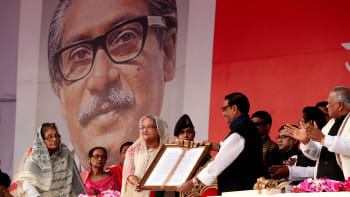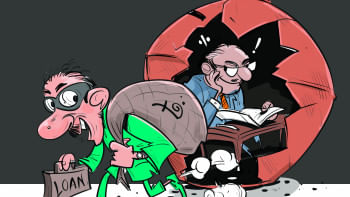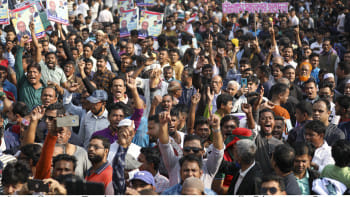Mahfuz Anam writes: What is the state of Awami League as a political party?

One has to hand it to the Awami League (AL) for its capacity to coin appropriate party slogans that capture the imagination of the public, especially that of the youth, and give it a modern image, explaining in very simple terms what the party will aim for in the immediate future. For the past two elections, this slogan was "Digital Bangladesh." How effectively we were able to make it a reality is not the question. It made the party feel modern, and making itself a part of the contemporary world was the political goal, which it succeeded in doing.
For the coming election in January 2024, the slogan will be "Smart Bangladesh," to be achieved by 2041. Again a very well-chosen two-word slogan that encapsulates the task ahead. And a very cleverly woven and subtly implied message here is: "Keep us in power till then, so that we can deliver this promise."
So, is the Awami League a "smart party" that can deliver a Smart Bangladesh?
The 73-year-old party re-elected its 75-year top leader for the 10th time in its 22nd triennial council on December 24, 2022. When Sheikh Hasina's present three-year term ends in 2025, she will have completed 45 years of continuously running the biggest and most significant political party in the country's history. Sheikh Hasina was two years old when AL was born in 1948, and has unquestionably been the most resilient, powerful, dominating, effective and successful leader that the AL has ever seen. As I wrote in my last piece, she is Awami League.
This brings us to the question: How healthy is it to have a political party in a democracy where nobody can contest for any post, however insignificant, and further still cannot even express his or her wish to do so and canvass for support and mobilise their team? After the formality of re-electing the president and secretary general, the Council unanimously empowered the party chief to name the rest of the full committee. The culture of selection practised over many years saw a repeat.
Sheikh Hasina has run the party for the last 42 years and the government for the last 15 years (20 years, if we include her first term in office between 1996-2001). So, how has being in continuous power for so long, without any check and balance to speak of, affected the Awami League?
As it moves towards the next election, the question that will inevitably come to the fore is of how successful the Awami League has been in keeping its promises.
In their election manifesto of 2018, there was a section titled "Our Special Pledges" containing 19 items. Of those, ones like women empowerment, food security, use of digital technology, implementation of mega-projects, energy security, mechanisation of agriculture, containing terrorism and extremism, elimination of poverty, and enhancement of facilities for the elderly, challenged people and those suffering from autism, are among the areas where moderate to considerable success has been achieved.

Some of the mega-projects have been implemented in good time, but their cost escalation and overall fund repayment burden on the economy may come back to haunt us in the future. Energy security has come a long way, but the paying of capacity charges far beyond the needed period and the cost of transition to LNG will have to be seriously looked into in the future, as these put severe strain on future resource allocation.
As a party, Awami League's biggest and most shameful failure has been in curbing corruption. Though it appears as the number one "special pledge" in its 2018 manifesto, not only has nothing effective been done to stem corruption, on the contrary, it has been turned into the new "normal." Corruption has been made a part of the everyday running of things, in which the ruling party can be said to have become an integral part. Nothing moves, attracts attention, and gets implemented without either influence or money.
The reputation of local AL bodies, the personal image of grassroots party workers, let alone of those holding higher positions all the way up to public representatives, have suffered deeply during the party's tenure in power. The activities of the local government, which is primarily an administrative function, has been usurped into the party. The election process itself has become so money-intensive that it almost naturally breeds high-level corruption, as the cost of getting "elected" has gone sky-high.
Corruption has not only eaten into our administrative processes, it has – most damagingly – eaten into the very entrails of the ruling party.
In its 2014 manifesto, the AL committed to eliminating "bribery, black money, extortion, corruption in the tendering process, and loan default" (what a joke the last one has become). Nine years on, where are we in implementing the above pledges? The answer is "blowing in the wind."
If we go further back, to the time when Awami League returned to power in 2008, what did it promise to the people? Under the section titled "What type of Bangladesh we want to see by 2021," it committed to establish i) a credible election system, an accountable and transparent government, and take all measures to make parliament effective; ii) prevent politicisation of various state agencies and the bureaucracy, making qualifications, competence, honesty and seniority the only criteria for recruitment and promotions in the administration; and iii) inculcate tolerance, democracy, financial transparency, honesty and inner-democracy among all political parties and bring about a change in the political culture.
Reading what was pledged and experiencing what has been delivered gives us an idea of the state of politics in Bangladesh, and more so about the nature of our political parties (for BNP would replicate the same), and specifically that of the present ruling party.
Awami League today is a party far removed from the ideals of its birth and those of its most glorious phase – our Liberation War. Is its utterances of Bangabandhu's name with every breath more to follow the party line or to show respect to the Father of The Nation? In fact, it is my view that the biggest mistake that was made over the years was to make no distinction – especially in public – between those who genuinely love and respect Bangabandhu, and those who use his legacy to promote themselves. This is where the genuine and the fake got mixed up and the ideological Awami Leaguers got overwhelmed by the self-serving ones – the latter being far more conniving and richer, with an extraordinary ability to manipulate a situation to their advantage.
In this regard, the Chhatra League comes to mind. During the Six-Point Movement of 1966-67 and, far more so, during the 11-Point Movement of 1969-70, I, as a member of Chhatra Union (Matia Group), had almost daily interactions with the former as our two parties jointly participated in numerous demonstrations, meetings and street agitation. I remember being in the same procession as Sheikh Kamal and thousands of other Chhatra Leaguers, who personified the nationalist slogan "Jago, jago, Bangalee jago" far better than many in the Chhatra Union.
So what does the Awami League, that just concluded its 22nd party council, have to offer to the nation? If the party leadership is the same as before, then will they offer the same things to the nation as before?
During the last decade and a half of Awami League's rule, our development curve rose while our democracy curve fell. One can say that bridges replaced our voices. While we have more roads, higher per capita income, and rising exports, we also have less participation in governance, a weaker role in electing those who we want to represent us and, most importantly, are able to say far less than what we feel.
Mahfuz Anam is the editor and publisher of The Daily Star.

 For all latest news, follow The Daily Star's Google News channel.
For all latest news, follow The Daily Star's Google News channel. 







Comments